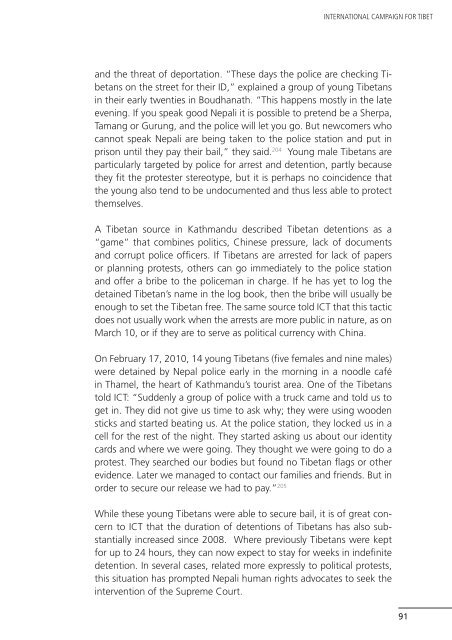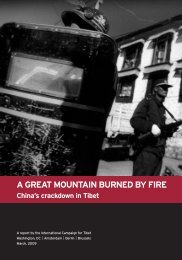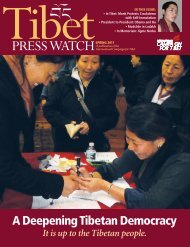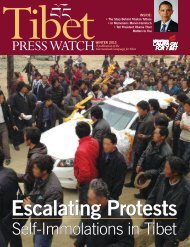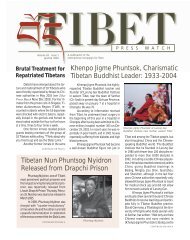DANGEROUS CROSSING: - International Campaign for Tibet
DANGEROUS CROSSING: - International Campaign for Tibet
DANGEROUS CROSSING: - International Campaign for Tibet
You also want an ePaper? Increase the reach of your titles
YUMPU automatically turns print PDFs into web optimized ePapers that Google loves.
INTERNATIONAL CAMPAIGN FOR TIBET<br />
and the threat of deportation. “These days the police are checking <strong>Tibet</strong>ans<br />
on the street <strong>for</strong> their ID,” explained a group of young <strong>Tibet</strong>ans<br />
in their early twenties in Boudhanath. “This happens mostly in the late<br />
evening. If you speak good Nepali it is possible to pretend be a Sherpa,<br />
Tamang or Gurung, and the police will let you go. But newcomers who<br />
cannot speak Nepali are being taken to the police station and put in<br />
prison until they pay their bail,” they said. 204 Young male <strong>Tibet</strong>ans are<br />
particularly targeted by police <strong>for</strong> arrest and detention, partly because<br />
they fit the protester stereotype, but it is perhaps no coincidence that<br />
the young also tend to be undocumented and thus less able to protect<br />
themselves.<br />
A <strong>Tibet</strong>an source in Kathmandu described <strong>Tibet</strong>an detentions as a<br />
“game” that combines politics, Chinese pressure, lack of documents<br />
and corrupt police officers. If <strong>Tibet</strong>ans are arrested <strong>for</strong> lack of papers<br />
or planning protests, others can go immediately to the police station<br />
and offer a bribe to the policeman in charge. If he has yet to log the<br />
detained <strong>Tibet</strong>an’s name in the log book, then the bribe will usually be<br />
enough to set the <strong>Tibet</strong>an free. The same source told ICT that this tactic<br />
does not usually work when the arrests are more public in nature, as on<br />
March 10, or if they are to serve as political currency with China.<br />
On February 17, 2010, 14 young <strong>Tibet</strong>ans (five females and nine males)<br />
were detained by Nepal police early in the morning in a noodle café<br />
in Thamel, the heart of Kathmandu’s tourist area. One of the <strong>Tibet</strong>ans<br />
told ICT: “Suddenly a group of police with a truck came and told us to<br />
get in. They did not give us time to ask why; they were using wooden<br />
sticks and started beating us. At the police station, they locked us in a<br />
cell <strong>for</strong> the rest of the night. They started asking us about our identity<br />
cards and where we were going. They thought we were going to do a<br />
protest. They searched our bodies but found no <strong>Tibet</strong>an flags or other<br />
evidence. Later we managed to contact our families and friends. But in<br />
order to secure our release we had to pay.” 205<br />
While these young <strong>Tibet</strong>ans were able to secure bail, it is of great concern<br />
to ICT that the duration of detentions of <strong>Tibet</strong>ans has also substantially<br />
increased since 2008. Where previously <strong>Tibet</strong>ans were kept<br />
<strong>for</strong> up to 24 hours, they can now expect to stay <strong>for</strong> weeks in indefinite<br />
detention. In several cases, related more expressly to political protests,<br />
this situation has prompted Nepali human rights advocates to seek the<br />
intervention of the Supreme Court.<br />
91


